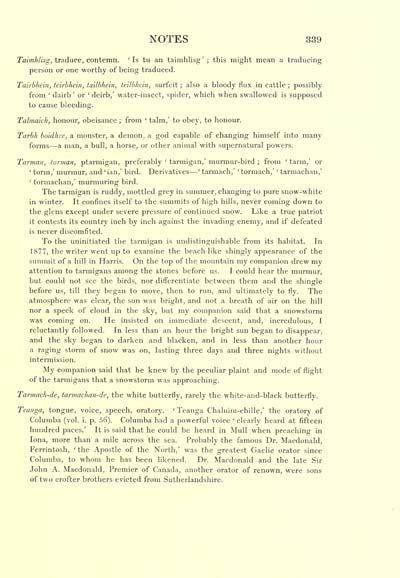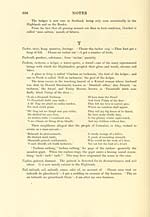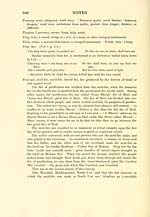Blair Collection > Carmina gadelica > Volume 2
(359)
Download files
Complete book:
Individual page:
Thumbnail gallery: Grid view | List view

NOTES 339
Taimhlisg, traduce, contemn. ' Is tu an taimhlisg ' ; this might mean a traducing
person or one worthy of being traduced.
Tairbhein, leirhkein, tailbhein, leilbhein, surfeit ; also a bloody flux in cattle ; possibly
from ' dairb ' or ' deirb/ water-insect, spider, which when swallowed is supposed
to cause bleeding.
Talmaich, honour, obeisance ; from ' talm,' to obey, to honour.
Tarbh buidhie, a monster, a demon, a god capable of changing himself into many
forms — a man, a bull, a horse, or other animal with supernatural powers.
Tamian, torman, ptarmigan, preferably ' tarmigan,' murmur-bird ; from ' tarni," or
' torm,' murmur, and 'ian,' bird. Derivatives — ' tarmach,' 'tormach,' ' tarmachan,'
' tormachan,' murmuring bird.
The tarmigan is ruddj', mottled grey in summer, changing to pure snow-white
in winter. It confines itself to the summits of liigh hills, never coming down to
the glens except under severe pressure of continued snow. Like a true patriot
it contests its country inch by inch against the invading enemy, and if defeated
is never discomfited.
To the uninitiated the tarmigan is undistinguishable from its habitat. In
1877, the writer went up to examine the beach-like shingly appearance of the
summit of a hill in Harris. On the top of the mountain my companion drew my
attention to tarmigans among the stones before us. I could hear the murmur,
but could not see the birds, nor differentiate between them and the shingle
before us, till they began to move, then to run, and ultimately to fly. The
atmosphere was clear, the sun was bright, and not a breath of air on the hill
nor a speck of cloud in the sky, but my companion said that a snowstorm
was coming on. He insisted on immediate descent, and, incredulous, I
reluctantly followed. In less than an hour the bright sun began to disappear,
and the sky began to darken and blacken, and in less than another hour
a raging storm of snow was on, lasting three days and three nights without
intermission.
My companion said that he knew by the peculiar plaint and mode of flight
of the tarmigans that a snowstorm was approaching.
Tarmach-de, tarmachan-de, the white butterfly, rarely the white-and-black butterfly.
Teanga, tongue, voice, speech, oratory. 'Teanga Chaluim-chille,' the oratory of
Columba (vol. i. p. 56). Columba had a powerful voice ' clearly heard at fifteen
hundred paces.' It is said that he could be heard in Mull when preaching in
lona, more than a mile across the sea. Probably the famous Dr. Macdonald,
Ferrintosh, 'the Apostle of the North,' was the greatest Gaelic orator since
Columba, to whom he has been likened. Dr. Macdonald and the late Sir
John A. Macdonald, Premier of Canada, another orator of renown, were sons
of two crofter brothers evicted from Sutherlandshire.
Taimhlisg, traduce, contemn. ' Is tu an taimhlisg ' ; this might mean a traducing
person or one worthy of being traduced.
Tairbhein, leirhkein, tailbhein, leilbhein, surfeit ; also a bloody flux in cattle ; possibly
from ' dairb ' or ' deirb/ water-insect, spider, which when swallowed is supposed
to cause bleeding.
Talmaich, honour, obeisance ; from ' talm,' to obey, to honour.
Tarbh buidhie, a monster, a demon, a god capable of changing himself into many
forms — a man, a bull, a horse, or other animal with supernatural powers.
Tamian, torman, ptarmigan, preferably ' tarmigan,' murmur-bird ; from ' tarni," or
' torm,' murmur, and 'ian,' bird. Derivatives — ' tarmach,' 'tormach,' ' tarmachan,'
' tormachan,' murmuring bird.
The tarmigan is ruddj', mottled grey in summer, changing to pure snow-white
in winter. It confines itself to the summits of liigh hills, never coming down to
the glens except under severe pressure of continued snow. Like a true patriot
it contests its country inch by inch against the invading enemy, and if defeated
is never discomfited.
To the uninitiated the tarmigan is undistinguishable from its habitat. In
1877, the writer went up to examine the beach-like shingly appearance of the
summit of a hill in Harris. On the top of the mountain my companion drew my
attention to tarmigans among the stones before us. I could hear the murmur,
but could not see the birds, nor differentiate between them and the shingle
before us, till they began to move, then to run, and ultimately to fly. The
atmosphere was clear, the sun was bright, and not a breath of air on the hill
nor a speck of cloud in the sky, but my companion said that a snowstorm
was coming on. He insisted on immediate descent, and, incredulous, I
reluctantly followed. In less than an hour the bright sun began to disappear,
and the sky began to darken and blacken, and in less than another hour
a raging storm of snow was on, lasting three days and three nights without
intermission.
My companion said that he knew by the peculiar plaint and mode of flight
of the tarmigans that a snowstorm was approaching.
Tarmach-de, tarmachan-de, the white butterfly, rarely the white-and-black butterfly.
Teanga, tongue, voice, speech, oratory. 'Teanga Chaluim-chille,' the oratory of
Columba (vol. i. p. 56). Columba had a powerful voice ' clearly heard at fifteen
hundred paces.' It is said that he could be heard in Mull when preaching in
lona, more than a mile across the sea. Probably the famous Dr. Macdonald,
Ferrintosh, 'the Apostle of the North,' was the greatest Gaelic orator since
Columba, to whom he has been likened. Dr. Macdonald and the late Sir
John A. Macdonald, Premier of Canada, another orator of renown, were sons
of two crofter brothers evicted from Sutherlandshire.
Set display mode to: Large image | Transcription
Images and transcriptions on this page, including medium image downloads, may be used under the Creative Commons Attribution 4.0 International Licence unless otherwise stated. ![]()
| Early Gaelic Book Collections > Blair Collection > Carmina gadelica > Volume 2 > (359) |
|---|
| Permanent URL | https://digital.nls.uk/75841173 |
|---|
| Description | Volume 2. Uibe (incantations) Measgain (miscellaneous) Notes. Names of the reciters of the poems. |
|---|---|
| Shelfmark | Blair.62 |
| Attribution and copyright: |
|
| Description | A selection of books from a collection of more than 500 titles, mostly on religious and literary topics. Also includes some material dealing with other Celtic languages and societies. Collection created towards the end of the 19th century by Lady Evelyn Stewart Murray. |
|---|
| Description | Selected items from five 'Special and Named Printed Collections'. Includes books in Gaelic and other Celtic languages, works about the Gaels, their languages, literature, culture and history. |
|---|

